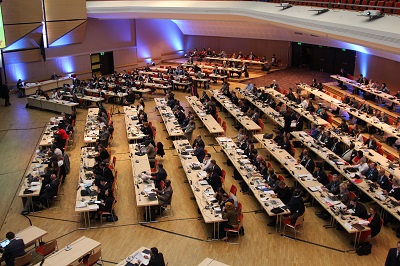
Three hundred and fifty participants from more than 74 countries gathered in Budapest from 17 to 19 November 2015 for the seventh session of the Meeting of the Parties to the UNECE Convention on the Protection and Use of Transboundary Watercourses and International Lakes (Water Convention) in order to discuss how to manage transboundary waters sustainably in the face of climate change, intersectoral competition and pollution.
Welcoming the newly established Sustainable Development Goal (SDG) on Water, which includes a target on transboundary water cooperation, participants stressed the need for a dedicated indicator on transboundary cooperation. Parties also adopted a regular reporting mechanism, which will provide information on the implementation of the provisions of the Convention as well as of the water Goal and in particular target 6.5. The national reports will accumulate lessons learned, good practices and experiences, and will support non-Parties in their accession efforts. The reporting mechanism will start with a pilot reporting in 2016–2017 and will be reviewed in 2018.
“After 40 years of trying, countries of the world have managed to agree this year on a common vision, which sets out nothing less than a change in our development trajectory”, stated the President of Hungary, János Áder, in his opening message read out by Mr. Csaba Körösi, former co-Chair of the Open Working Group which negotiated the SDGs in 2013–2014. “This entails the idea that sustainable management of our water resources can only be successful through an integrated assessment of environmental, social and economic considerations. That also means that by living on the same river basin, we also share the responsibility for it. Some of the necessary legal frameworks to implement this paradigm change have already been established, while some others are still in progress. This is why I consider it important that the Water Convention is now open to non-European countries. It is the archetype of the case when a good decision can be a win-win solution.”
Recognizing the relevance and value-added of the Water Convention, several countries from outside the UNECE region expressed their intentions to accede, such as Chad, Iraq, Jordan, Lebanon and Tunisia. Therefore, the meeting decided to establish a framework and develop a strategy for the implementation of the Convention at the global level. As United Nations Deputy Secretary-General Jan Eliasson said in his video message: “With a global membership, the Water Convention can offer an essential intergovernmental platform and a home in the United Nations system for dealing with transboundary water issues”.
Climate change, land degradation, water pollution, floods and droughts do not distinguish between developing and developed countries. An ambitious programme of work for 2016–2018 was therefore adopted in Budapest that will support the future development of the Convention into a global instrument for transboundary water cooperation. For example, it will include implementation of the guidelines and recommendations in the newly adopted flagship publications on assessing the benefits of transboundary cooperation and assessing the water-energy-food-ecosystems nexus in transboundary basins. With regard to climate change, the discussions at the meeting also linked up with the upcoming twenty-first Conference of the Parties to the United Nations Framework Convention on Climate Change in Paris. Several countries, organizations and basins signed the “Paris Pact on water and adaptation to climate change in the basins of rivers, lakes and aquifers”, which was initiated by France and has received nearly 200 signatures worldwide.
Documents, statements, interventions and presentations delivered during the Meeting of the Parties are available from the following web page: http://www.unece.org/env/water/mop7.html#/
Report by IISD: http://www.iisd.ca/water/unece/mop7/

